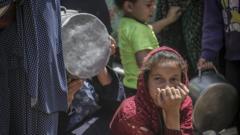The situation in Gaza has reached a critical point as the recent resurgence of conflict has led to an acute humanitarian crisis. Pascal Hundt, deputy director of operations at the International Committee of the Red Cross, noted that civilians in Gaza are struggling daily amidst hostilities and a blockade that has cut off all humanitarian assistance. This precarious environment is being seen by many as a significant escalation that cannot be disregarded.
Since Israel resumed hostilities on March 18 after a two-month ceasefire, the gates to Gaza have been sealed, blocking vital supplies including food and medical aid. The renewed airstrikes have extinguished the possibility of transitioning to the ceasefire's proposed framework, aimed at exchanging hostages for a full military withdrawal. Prime Minister Benjamin Netanyahu faces internal pressures from ultra-nationalist factions within his government, who advocate for a militarized approach to Gaza, seeking to replace the local population with Jewish settlers.
During an interview with Philippe Lazzarini, the commissioner-general of UNRWA, he emphasized the dire consequences of the blockade, which has left Gazans without any aid for over two months. Lazzarini condemned the starvation of civilians as a weapon in the broader conflict, indicating that the dire humanitarian situation may lead to unprecedented famine levels. The IPC reported that Gaza's population is facing severe food insecurity, with almost half being children. There is an urgent need for humanitarian aid, which remains obstructed at the border with Egypt.
As criticism of Israeli policies escalates globally, Lazzarini labeled the denial of food to civilians as a potential war crime, affirming that it has detrimental effects on the civilian population. The rhetoric from Israeli leadership suggests that the continuation of the blockade is seen as a tactical maneuver to secure military objectives against Hamas.
The ongoing conflict is also sparking dissent among Israeli citizens, including families of hostages who argue that the tactics employed may compromise their safety and well-being. Reports indicate that even within Israel, there is growing unease about the government's approach to the conflict and its humanitarian implications. Calls for investigations into potential war crimes are emerging from various quarters, placing pressure on both the Israeli government and Hamas.
The international community appears divided, with some states calling for accountability and action against alleged war crimes while others express cautious support for Israel’s right to defend itself. This complexity characterizes the war between Israel and Hamas, igniting global conversations about the ethics of warfare and the treatment of civilians caught in the crossfire.
As discussions of genocide surface from some quarters, experts caution against hasty labels, yet the humanitarian implications are undeniable. The UN humanitarian office's estimates reflect a dire landscape: Gaza is nearing famine conditions, prompting urgent calls for international response. Lazzarini articulated a sense of frustration over the global inaction, calling it monstrous.
Looking ahead, the path toward resolution is obscured by political maneuverings and military strategies on both sides, with little indication that peace is achievable in the near future. As the conflict continues to unfold, the humanitarian crisis may deepen, raising concerns over the long-lasting impact on Palestine and its people, as well as the moral ramifications of inaction by the global community.


















